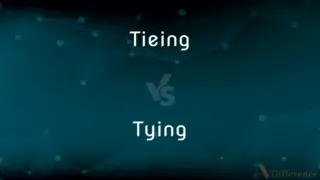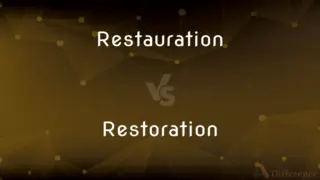Rythme vs. Rhythm — Which is Correct Spelling?
By Tayyaba Rehman — Updated on March 25, 2024
"Rythme" is an incorrect spelling, while "Rhythm" is correct and refers to a repeated pattern of sound or movement.
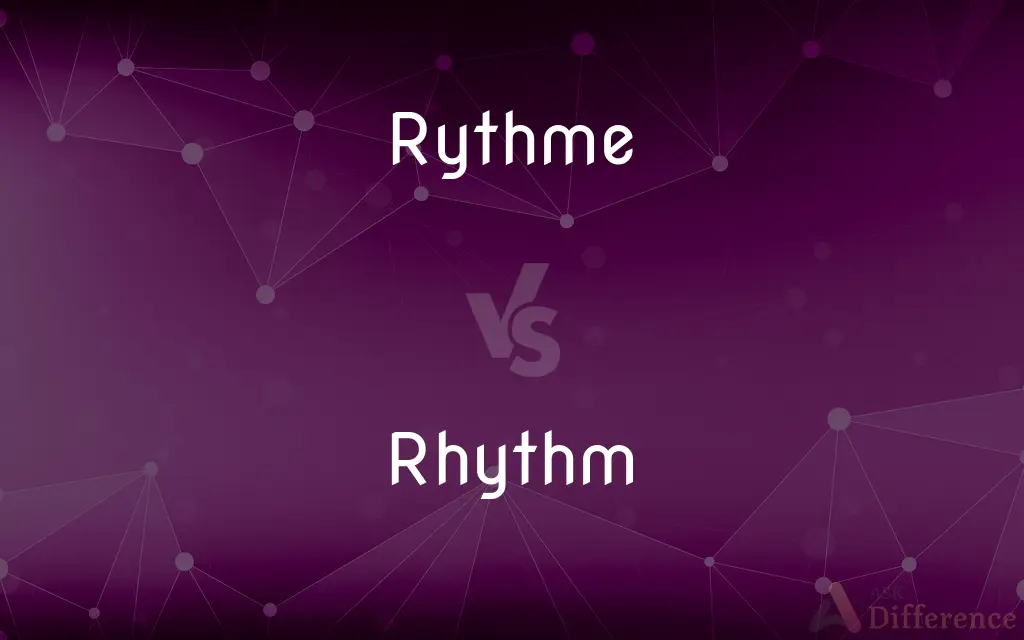
Table of Contents
Which is correct: Rythme or Rhythm
How to spell Rhythm?

Rythme
Incorrect Spelling

Rhythm
Correct Spelling
ADVERTISEMENT
Key Differences
Remember that correct English spellings often end in "thm," not "thme."
Visualize the beats in music as "Rhythm" dictates their pattern without the letter "e."
Imagine "Rythme" as having an extra and unnecessary "e" at the end.
Think of the word "hymn" within "Rhythm" to recall its correct spelling.
Use mnemonic devices like: "Rhythms Have Your Time Harmonized."
ADVERTISEMENT
How Do You Spell Rhythm Correctly?
Incorrect: The heart's rythme is essential to monitoring health.
Correct: The heart's rhythm is essential to monitoring health.
Incorrect: I can't get the rythme of this drum pattern right.
Correct: I can't get the rhythm of this drum pattern right.
Incorrect: Your finger lacks the rythme needed for this piece.
Correct: Your finger lacks the rhythm needed for this piece.
Incorrect: She tried to dance to the rythme of the song but was off beat.
Correct: She tried to dance to the rhythm of the song but was off beat.
Incorrect: His poetry has a unique rythme that captivates readers.
Correct: His poetry has a unique rhythm that captivates readers.
Rhythm Definitions
Rhythm denotes the timed sequence in speech or music.
His speech had a soothing rhythm.
Rhythm refers to the arrangement of beats or accents in music.
The song had a fast-paced rhythm.
Rhythm is a repeated pattern of sound or movement.
The rhythm of the song was contagious.
Rhythm indicates the pacing of any activity.
He found the rhythm in his daily exercise routine.
Rhythm (from Greek ῥυθμός, rhythmos, "any regular recurring motion, symmetry"—Liddell and Scott 1996) generally means a "movement marked by the regulated succession of strong and weak elements, or of opposite or different conditions" (Anon. 1971, 2537).
Movement or variation characterized by the regular recurrence or alternation of different quantities or conditions
The rhythm of the tides.
The patterned, recurring alternations of contrasting elements of sound or speech.
The patterning of musical sound, as by differences in the timing, duration, or stress of consecutive notes.
A specific kind of such patterning
A waltz rhythm.
A group of instruments supplying the rhythm in a band.
The pattern or flow of sound created by the arrangement of stressed and unstressed syllables in accentual verse or of long and short syllables in quantitative verse.
The similar but less formal sequence of sounds in prose.
A specific kind of metrical pattern or flow
Iambic rhythm.
The sense of temporal development created in a work of literature or a film by the arrangement of formal elements such as the length of scenes, the nature and amount of dialogue, or the repetition of motifs.
A regular or harmonious pattern created by lines, forms, and colors in painting, sculpture, and other visual arts.
The pattern of development produced in a literary or dramatic work by repetition of elements such as words, phrases, incidents, themes, images, and symbols.
Procedure or routine characterized by regularly recurring elements, activities, or factors
The rhythm of civilization.
The rhythm of the lengthy negotiations.
The variation of strong and weak elements (such as duration, accent) of sounds, notably in speech or music, over time; a beat or meter.
Dance to the rhythm of the music.
A specifically defined pattern of such variation.
Most dances have a rhythm as distinctive as the Iambic verse in poetry
A flow, repetition or regularity.
Once you get the rhythm of it, the job will become easy.
The tempo or speed of a beat, song or repetitive event.
We walked with a quick, even rhythm.
The musical instruments which provide rhythm (mainly; not or less melody) in a musical ensemble.
The Baroque term basso continuo is virtually equivalent to rhythm
A regular quantitative change in a variable (notably natural) process.
The rhythm of the seasons dominates agriculture as well as wildlife
Controlled repetition of a phrase, incident or other element as a stylistic figure in literature and other narrative arts; the effect it creates.
The running gag is a popular rhythm in motion pictures and theater comedy
A person's natural feeling for rhythm.
That girl's got rhythm, watch her dance!
In the widest sense, a dividing into short portions by a regular succession of motions, impulses, sounds, accents, etc., producing an agreeable effect, as in music poetry, the dance, or the like.
Movement in musical time, with periodical recurrence of accent; the measured beat or pulse which marks the character and expression of the music; symmetry of movement and accent.
A division of lines into short portions by a regular succession of arses and theses, or percussions and remissions of voice on words or syllables.
The harmonious flow of vocal sounds.
The basic rhythmic unit in a piece of music;
The piece has a fast rhythm
The conductor set the beat
Recurring at regular intervals
An interval during which a recurring sequence of events occurs;
The neverending cycle of the seasons
The arrangement of spoken words alternating stressed and unstressed elements;
The rhythm of Frost's poetry
Natural family planning in which ovulation is assumed to occur 14 days before the onset of a period (the fertile period would be assumed to extend from day 10 through day 18 of her cycle)
Rhythm represents the regularity or recurrence of events.
The daily rhythm of life continued uninterrupted.
Rhythm Meaning in a Sentence
The drummer's rhythm set the pace for the entire band.
He struggled to maintain a steady rhythm during the marathon.
The rhythm of the waves calmed her nerves.
Without rhythm, the dancers would not be in sync.
The poem's rhythm added to its emotional impact.
In speech, rhythm can influence the message's impact.
Children often learn language patterns through rhythm and rhyme.
The rhythm of the train's wheels made him feel drowsy.
The rhythm of her breathing indicated she was asleep.
The music teacher emphasized the importance of rhythm in music.
The rhythm of footsteps in the hallway signaled his arrival.
The rhythm of daily life changes with each season.
Practicing rhythm helps musicians play together.
Her routine provided a comforting rhythm to her day.
The heart's rhythm can be affected by stress.
Maintaining a consistent rhythm in exercise can improve results.
The rhythm of a song can dictate your mood.
In writing, rhythm can enhance the reader's experience.
The rhythm of rain on the roof was soothing.
Rhythm in art can guide the viewer's eye across the piece.
Rhythm Idioms & Phrases
Out of rhythm
Not in sync or lacking coordination.
After the long break, the team seemed out of rhythm during practice.
Rhythm of life
The regular pattern of activities or the pace at which life is lived.
Moving from the city to the countryside changed the rhythm of life for them completely.
In rhythm with
Being in harmonious agreement or sync with something.
He found a dance partner who was perfectly in rhythm with his moves.
Catch the rhythm
To understand and follow the pattern or pace of something.
It took him a few tries to catch the rhythm of the complex dance steps.
Common Curiosities
Why is it called Rhythm?
It's called Rhythm due to its Greek origin "rhythmos," meaning "measured motion."
Which vowel is used before Rhythm?
Typically, no vowel is used directly before "Rhythm."
What is the verb form of Rhythm?
The verb form related to "Rhythm" is "rhythmicize."
What is the singular form of Rhythm?
The singular form is Rhythm.
What is the pronunciation of Rhythm?
Rhythm is pronounced as "RITH-um."
Which preposition is used with Rhythm?
Various prepositions can be used, but commonly "to" and "of," as in "rhythm of life" or "move to the rhythm."
Is Rhythm a negative or positive word?
Rhythm is neutral; its connotation depends on context.
Which article is used with Rhythm?
Both "a" and "the" can be used, as in "a rhythm" or "the rhythm."
What is the root word of Rhythm?
The root word of Rhythm is "rhythmos" from Greek.
Is Rhythm a collective noun?
No, Rhythm is not a collective noun.
Is the word Rhythm is imperative?
No, Rhythm is not an imperative verb.
What is the plural form of Rhythm?
The plural form is "Rhythms."
Which conjunction is used with Rhythm?
Any conjunction can be used with Rhythm, depending on sentence structure.
Is Rhythm a countable noun?
It can be. For example, one can speak of multiple rhythms in different songs.
What is another term for Rhythm?
Another term for Rhythm is "beat."
What is the second form of Rhythm?
Rhythm does not have verb forms like regular verbs.
Is Rhythm an abstract noun?
Yes, Rhythm is considered an abstract noun as it denotes an idea or concept.
What is the first form of Rhythm?
Rhythm itself is the base form.
What is the third form of Rhythm?
As a noun, Rhythm doesn't have a third form like verbs.
Is the Rhythm term a metaphor?
The term itself is not a metaphor, but it can be used metaphorically.
How do we divide Rhythm into syllables?
Rhythm.
What part of speech is Rhythm?
Rhythm is a noun.
Is Rhythm a noun or adjective?
Rhythm is primarily a noun.
Is Rhythm an adverb?
No, Rhythm is not an adverb.
Is Rhythm a vowel or consonant?
Rhythm is a word, not a single letter, so it contains both vowels and consonants.
How many syllables are in Rhythm?
One syllables..
What is a stressed syllable in Rhythm?
The first syllable, "Rhythm," is stressed.
What is the opposite of Rhythm?
The opposite of Rhythm might be "arrhythmia" or "chaos" in some contexts.
Which determiner is used with Rhythm?
Determiners like "the," "this," "that," "a," and "an" can be used with Rhythm.
How is Rhythm used in a sentence?
Example: The rhythm of the rain on the roof was calming.
Share Your Discovery
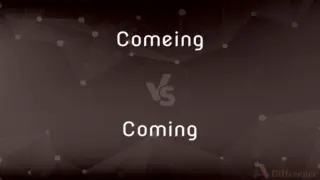
Previous Comparison
Comeing vs. Coming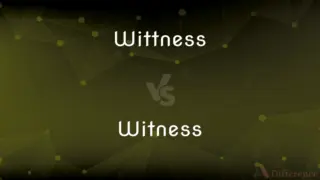
Next Comparison
Wittness vs. WitnessAuthor Spotlight
Written by
Tayyaba RehmanTayyaba Rehman is a distinguished writer, currently serving as a primary contributor to askdifference.com. As a researcher in semantics and etymology, Tayyaba's passion for the complexity of languages and their distinctions has found a perfect home on the platform. Tayyaba delves into the intricacies of language, distinguishing between commonly confused words and phrases, thereby providing clarity for readers worldwide.

